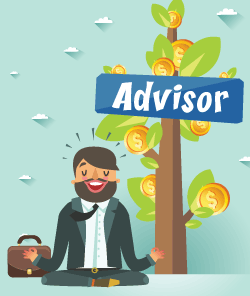There’s a story that’s told of an old farmer who had toiled in his fields for many years. One day his horse ran away. Upon hearing the news, his neighbors came to the farmer’s house to console him.
“Such bad luck,” they said sympathetically.
“Maybe,” the farmer replied.
The next morning the horse returned, bringing with it three other wild horses.
“How wonderful!” the neighbors exclaimed.
“Maybe,” replied the old man.
The following day, his son tried to ride one of the wild horses, was thrown, and broke his leg.
The neighbors again came to offer their pity on his misfortune.
“Maybe,” answered the farmer.
The next day, military officials came to the village to draft young men into the army. Seeing that the son’s leg was broken, they passed him by. The neighbors toasted the farmer on how well things had turned out.
“Maybe,” said the farmer.
The inherent message of the Zen Farmer is that one can never really know where the winds of prosperity will blow, or even how they will chart one’s course, or, eventually, how those winds may guide one’s future. Understanding this, I don’t throw my hands up in defeat and refuse to farm. I modify my expectations, making certain I am using the best farm equipment I can find. And I go into the fields every day knowing I am neither the master of my destiny, nor the victim of it, but instead, a student of it.
At Balser Wealth Management I frequently use the phrase, “What is, is.” My view is similar to the Zen Farmer’s phrase, “Maybe.” Where some folks see pessimism and despair, I see confidence and prosperity. I am aware and conscious of that which I do not know. Whereas the Zen Farmer’s neighbors are content to ride the roller coaster of life’s highs and lows. They regularly exaggerate the role they believe they play in the farmer’s life. But the Zen Farmer is at peace with the fact that whatever fortune may bring, good or bad, he plays no role in it.
By letting go of the things I cannot control, I allow my mind and body to concentrate upon those qualities of life in which I have greater influence.
More than 20 years ago I chose to become a craftsman in the Point-and-Figure method of investing. I, in essence, became a Zen Financial Advisor. And in so doing I accepted the understanding that I have no control over what the markets will do or when they will do it. I only control how I will respond and how I will make decisions for my clients.
I admit that I am powerless to change the course of the financial markets, but I also take full responsibility for my exposure to any specific market and the reason behind it. By following indicators that are based on supply and demand I agree to admit failure when the market dictates I am in poor investments. I don’t complain, I adapt. I don’t know why the market rejected my investments, only that it did. I don’t know everything about the market; I simply know “what is.”
Admitting defeat isn’t pleasant, but it’s necessary in preserving wealth. Just as unsuccessful investments must be taken in stride, I must also accept that I don’t know all of the reasons I’m entering an investment when I buy. My tools are designed to increase the odds of success.
My point is that the Zen Financial Advisor is happy to accept that which he does not know because he has a set of tools to guide him through the good and the bad of the markets, and to deal with the unknowable aspects of the market. That’s when the Zen kicks in, as we let go of the ties that emotionally bind so many investors to the dramatizations echoed on the financial media. Admitting that I have no control is paradoxically empowering.
The Zen Farmer isn’t any better than his neighbors; he’s just better at focusing on the things that are important — the things he can change — and ignoring those things he cannot. Likewise, the Zen Financial Advisor is better at focusing on the things he can change within a portfolio by using tools to hedge risk and take advantage of opportunities, while ignoring the things he cannot, such as what the Federal Reserve does next, what the President tweets, or what Congress does or does not pass this year.
I don’t know, and I won’t know until I do know. But I will adapt along the way. I will always adapt.
MANA welcomes your comments on this article. Write to us at [email protected].



